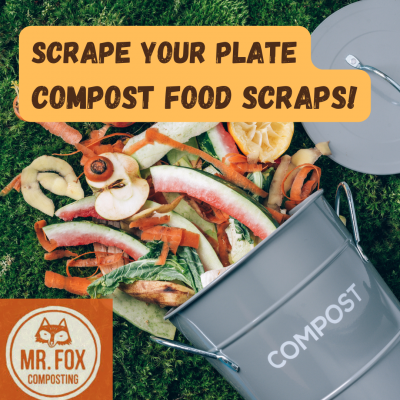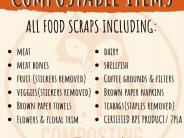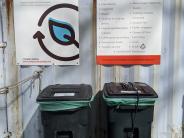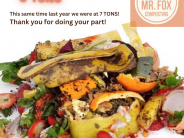Composting with Mr. Fox
The Town of Exeter is working with Mr. Fox Composting to collect compostable materials at the Transfer Station (Cross Road).
There are 64-gallon covered carts dedicated to food waste composting. Residents are required to provide their own container (pail/bucket) which can be purchased at any local hardware or home improvement store. Compostable paper or starch-based (green) bags provided by the resident are optional. The Town is not selling buckets or bags at this time. There is NO charge to participate in the Food Waste Composting program. Plastic bags, biodegradable bags, and foam are NOT allowed. All acceptable items for commercial composting can be placed in the same container.
Compostable Items:
- Meat, meat bones
- Brown paper napkins & towels
- Muffin wrappers
- Eggshells
- Teabags (staples removed), ground tea
- Coffee grounds & filters
- Sugar packets
- Bread
- Seafood (including shells)
- Fruits & vegetables (pits & nuts too)
- Flowers & floral trimmings
- Corks
- Soiled pizza boxes
- PLA#7
- Certified BPI packaging
- Wooden stirrers
Transfer Station Regular hours:
Tuesday: 9 am - 1 pm
Friday & Saturday: 9 am - 2:30 pm
Oct. 15 - Dec. 15 Transfer Station hours extended:
Tuesday: 9 am - 1:00 pm
Friday: 9 am - 2:30 pm
Saturday: 8 am - 2:30 pm
Sunday: Noon - 4:00 pm
What is Compost?
Compost collected at the Transfer Station is picked up by Mr. Fox Composting and brought back to their headquarters where the materials are treated and monitored for quality. The formula for quality compost includes maintaining an adequate moisture level, oxygen flow, particle size, and temperature to ensure the microorganisms effectively break down organic materials.
Compost is a dark, crumbly, earthy-smelling, biologically stable soil amendment produced by the aerobic decomposition of organic materials.
Why Compost?
Composting food waste and other compostable items has many benefits for households and the environment.
- Reduces household waste and eliminates bad odor in household trash
- Extends landfill capacity by diverting organic materials and saving space in landfills.
- Reduces solid waste management costs. Food scraps are one of the largest and heaviest portions of the waste stream, making their recovery increasingly cost-effective compared to disposal.
**Reduces the number of blue bags you use (saving $$)! - Protects the climate by reducing methane emissions from landfills
- Recycles organic materials into valuable soil
- Composting is nature’s way of recycling
Composting is a resourceful way to recycle the food scraps and yard trim you generate at home all year and manage your waste more sustainably. The finished compost improves plant growth and promotes higher yields of agricultural crops.
| Year | Pounds | Tons | Year | Pounds | Tons | |
| 2021 (est. April) | 16,564 | 8.3 | 2024 | 26,330 | 13 | |
| 2022 | 19,666 | 9.8 | 2025 | 24,080 | 12.04 | |
| 2023 | 22,406 | 11.2 | 2026 | 610 | .31 |
Composting is easy:
If you're NEW to composting there are different ways to compost. You can utilize the Mr. Fox Compost bins at the Transfer Station, you can create a small space in your yard for a compost pile, or you can purchase a composting bin from a retailer. It's important to do thorough research before composting at home. The list of compostable items above cannot all be composted in backyard compost.
Composting is easy when utilizing the Mr. Fox bins at the Transfer Station. Here are a few tips:
- Purchase compostable green bags (made up of starchy materials)
- Collect food scraps and other items listed above
- Utilize a container with lid (i.e. coffee can or other small container)
- Use a 5gallon bucket with lid outside of your home to collect your full bags
- If you can't make it to the Transfer Station quickly, freeze the compost until you can
- Drop off your compost at the Transfer Station during normal hours of operation (Tuesday 9-1, Friday & Saturday 9-2:30)
Click any thumbnail image to view a slideshow




